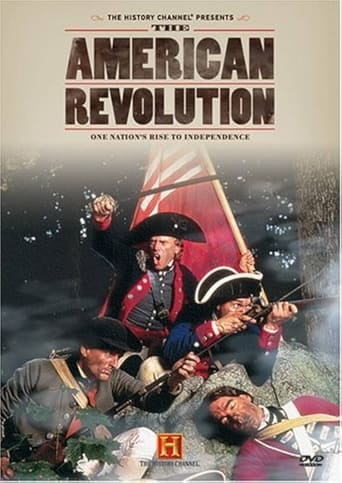The American Revolution Season 1

Thorough documentary of how the American Colonies rebelled against England and the personalities involved in the creation of a new nation.
Watch NowWith 30 Day Free Trial!
The American Revolution
1994 / NR
Thorough documentary of how the American Colonies rebelled against England and the personalities involved in the creation of a new nation.
Watch Trailer
With 30 Day Free Trial!
The American Revolution Season 1 Full Episode Guide
General Nathanael Greene becomes the new commander of the southern Continental Army. He and General Daniel Morgan devise a plan to defeat the British in the south. While Morgan defeats Banastre Tarleton at the Battle of the Cowpens, Greene leads Lord Cornwallis on an exhausting march across the Carolinas and Virginia, culminating in the Battle of Guildford Courthouse. An exhausted Cornwallis is forced into Virginia, where he is trapped by Washington and the French at Yorktown, effectively ending major combat in the War. The War ends and the soldiers return home. Rather than becoming king, George Washington resigns as commander of the Continental Army. The new countries government is weak and ineffective, leading to political turmoil, leading Washington to return to public life and lead the Constitutional Convention, becoming the new country's first president.
At West Point, a great chain protects the Hudson River. Benedict Arnold, after many wounds, becomes military governor of Philadelphia with disastrous consequences. Feeling disrespected and betrayed by his country, he accepts the command of West Point and negotiates with the British to surrender it. His traitorous plot is soon discovered, and while he escapes, his British contact, John Andre pays the ultimate price. The British Navy rules the seas and without the resources to build a comparable navy, the Americans send privateers to disrupt British trade. The British, French, and Spanish navies battle over the sugar islands of the West Indies. The war now becomes global, causing North America to become a secondary theater for the British. As the War becomes a stalemate in the north, the British turn to the south in search of victory. After capturing Charleston, South Carolina, the British all but destroy the southern Continental Army under General Horatio Gates at the Battle of Camden.
Benjamin Franklin travels to Paris to get financial and military support for the American war. Encouraged by Gates’ and Arnold’s victory at Saratoga, France forms an alliance with the Americans and enters the war. The French threat forces the British to abandon Philadelphia and consolidate their forces at New York City. Washington engages the retreating British at the Battle of Monmouth, the largest and hottest battle of the Revolutionary War. George Rogers Clark captures the Illinois Country for the Americans. British encouraged Native American raids in western Pennsylvania and the Mohawk River Valley of New York cause panic amongst colonial settlers. General Washington dispatches the Continental Army to destroy all Iroquois villages in the region, effectively ending the Iroquois Confederacy. The Continental Army suffers through the coldest winter of the War in Morristown, leading some troops to mutiny.
General Washington achieves his most decisive and important victories at the Battles of Trenton and Princeton. In 1777, after the Battles of Brandywine and Paoli, the British capture Philadelphia. Washington attempts to recapture Philadelphia but is defeated at Germantown. The Continental Army spends a cold winter at Valley Forge, remaking themselves into a professional army. In the meantime, Benedict Arnold delays the British advance from Canada during the naval battle of Valcour Bay. The following year, the British Army marching south from Canada surrenders to Generals Horatio Gates and Benedict Arnold at Saratoga, New York.
The tumultuous events of 1776 are discussed. George Washington becomes the commander in chief of the Continental Army. Benedict Arnold and Ethan Allen capture Fort Ticonderoga. Washington captures Boston. The Continental Army fails to capture Quebec. Benjamin Franklin returns from England. The Declaration of Independence is drafted and signed. Thomas Paine writes "Common Sense." New York City is captured by the British.
The causes of the American Revolution, from the French and Indian War, to the Stamp Act, the Boston Tea Party, and the Coercive Acts is discussed, culminating in the Battles of Lexington and Concord. Also covered is the Battle of Bunker Hill.
Free Trial Channels
Seasons


























